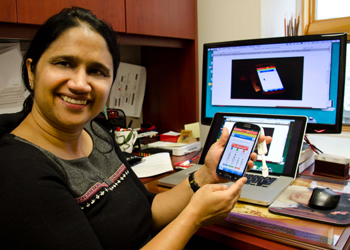Washington, DC, United States, and Montréal, Canada (September 15, 2017) – The International Association of Providers of AIDS Care (IAPAC), the Research Institute of the McGill University Health Centre (RI-MUHC), and SYMPACT-X have announced a partnership to implement HIVSmart!™ – a software application that facilitates HIV self-testing, linkages to care, and retention in care – in high HIV burden Fast-Track Cities worldwide.
Created by a team of scientists and physicians based at the RI-MUHC and at McGill University, HIVSmart!™ is a multilingual, portable software application that has been tested in well-designed studies in Canada and South Africa in four diverse patient populations: 1) high-risk men who have sex with men (MSM); 2) at-risk community clinic attendees; 3) low-risk healthcare professionals; and 4) low-risk student populations. The app, which works with any approved HIV self-test, provides a risk assessment tool to evaluate a user’s HIV exposure risk, user-friendly information to facilitate the self-testing process, test interpretation, and personalized linkages that reduce delays in care. In addition, the app based program assists with retention in care through enhanced patient-provider communication. The platform is confidential and HIPPA compliant and is currently available in six global languages.
“The global scale up of HIVSmart!™ with IAPAC is a dream come true for our innovative portable mobile application that enhances the HIV self-testing experience by helping to bridge the gap between HIV services and populations who are most vulnerable to infection and less likely to be able to access diagnosis and treatment. HIVSmart! will facilitate self-testing and rapid HIV treatment initiation thus leading to an AIDS-free generation,” said Dr. Nitika Pant Pai, who is an Associate Professor at McGill University and a Medical Scientist at the RI-MUHC. Dr. Pant Pai is also Founder/President of Sympact-X since 2015.
The Fast-Track Cities initiative is a global partnership between high HIV burden cities and four core partners – IAPAC, the Joint United Nations Programme on HIV/AIDS (UNAIDS), the United Nations Human Settlements Programme (UN-Habitat), and the City of Paris. Since its launch on World AIDS Day 2014, cities in every region of the world have joined the Fast-Track Cities network (www.iapac.org/cities), pledging to attain 90-90-90 targets by 2020. The targets translate into 90% of people living with HIV (PLHIV) knowing their status, 90% of PLHIV who know their status linked to care and initiated on antiretroviral therapy (ART), and 90% of PLHIV on ART achieving viral suppression.
HIV self-testing and the use of apps to promote HIV self-testing, linkage to care, and retention in care are strongly recommended in the 2015 IAPAC Guidelines for Optimizing the HIV Care Continuum for Adults and Adolescents1 , as well as the 2017 IAPAC/ASLM Recommendations for the Rapid Expansion of HIV SelfTesting in Fast-Track Cities.
Increasing knowledge of HIV status is noted as an important first step in optimizing the HIV care continuum by facilitating the use of ART – with its preventative and therapeutic benefits – and combination prevention adjuncts such as pre-exposure prophylaxis (PrEP).
“IAPAC is proud to partner with the RI-MUHC and SYMPACT-X to introduce and scale-up the implementation of the HIVSmart™ app as an innovative means of assisting Fast-Track Cities to attain the 90-90-90 targets – starting with the first 90 without which we cannot succeed in reaching the estimated 40% of PLHIV worldwide who do not know their status,” said Dr. José M. Zuniga, President/CEO of the International Association of Providers of AIDS Care (IAPAC).
Innovative technologies to improve HIV testing are critical to reaching the estimated 30% of people living with HIV (PLHIV) globally who remain undiagnosed. HIV self-testing has the potential to increase the proportion of PLHIV who know their status, reduce late HIV diagnosis, mitigate stigma and discrimination, and serve as an entry point to get more PLHIV on treatment and virally suppressed; thereby bringing us closer to attaining the global 90-90-90 testing and treatment targets.
“HIV self-testing is an empowering and innovative way of reaching key populations with undiagnosed HIV. There is often stigma and discrimination associated with going to an HIV clinic to be tested, but technology could play an important role to end the global HIV epidemic, and I am proud of our scientists like Dr. Nitika Pant Pai for being part of resolving this challenge,” said Dr. Bruce Mazer, Interim Executive Director and Chief Scientific Officer of the RI-MUHC.
September 18, 2017

